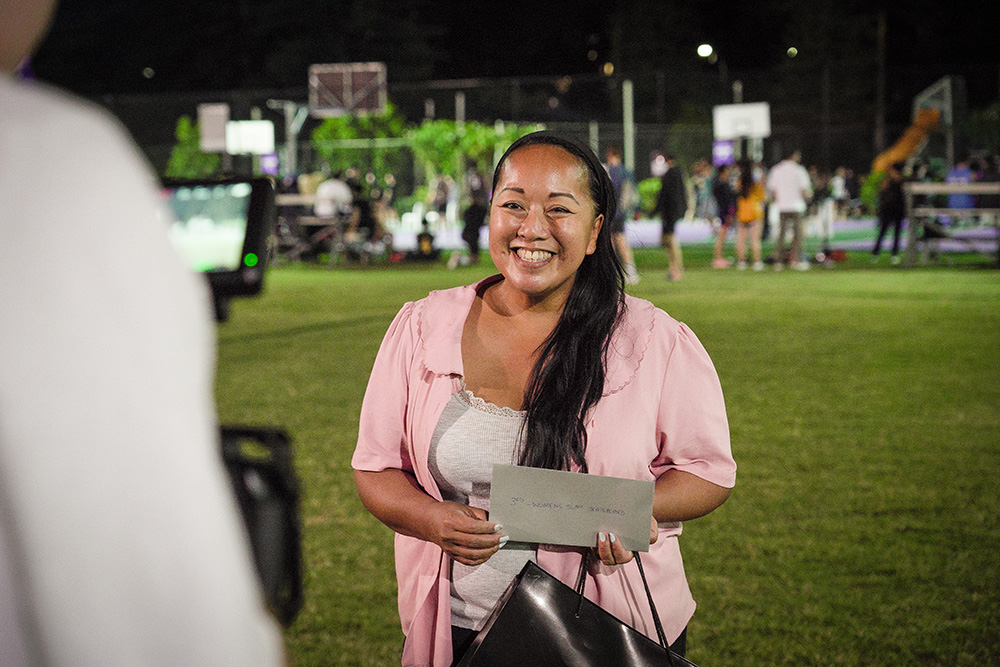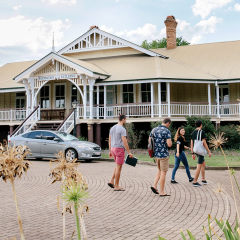
Dr Indigo Willing is UQ Alumni, active skateboarder, co-founder of the We Skate QLD network and works to encourage diversity and gender equity in skateboarding through her ongoing research and activism around the sport. Today she talks to us about her love for skateboarding, competing in in UQ’s first ever UQ Slam skateboarding tournament and the importance of skateboarding for mental health, inclusivity, diversity and building a sense of community.
The decision to incorporate skateboarding into this year’s 3x3 UQ Slam competition was a no brainer. With its rising resurgence after its debut in the 2021 Olympics, skateboarding has once again become a rising trend. Everywhere you look there seems to be someone – young or old, with a skateboard in hand, riding with a sense of freedom and nostalgia of the 80’s and 90’s. As the sport becomes more high profile, the stigma around it also starts to fade with more diverse groups and women getting involved, for nothing other than love for the sport.
Skateboarding is a huge trend at the moment, appearing in the Olympics for the first time. It seems to be blowing up everywhere. What is your involvement in the skateboarding community?
(Indigo) I do research on skateboarding looking at things like designing more inclusive spaces, encouraging more genders to participate and intersectional issues that have led skaters to be activists and advocates. This includes things like being environmentalists to fighting racism.
I also co-founded a skate network called We Skate QLD (with Evie Ryder, Tora Waldren, Millie Miljevic and others) for women, non-binary skaters and allies to have skate meet ups and events as it’s traditionally a very macho culture, but everyone can skate. It’s more fun with more diversity.
The Consent is Rad campaign is also something I’m involved with as a project leader and co-founder. It focuses on promoting a more respectful culture of consent in skating and sexual violence prevention. It’s not that skating has more issues, but that in any sport or subculture, there’s important conversations to have to keep things safe, fun and free of intimidation etc.
You came third in the Alumni competition. Tell us more about this and the day! Did you have fun? What was the atmosphere like?
(Indigo) Haha! Oh wow. The vibe was as skateboarding should be, lots of fun and good energy. Skating is as competitive and an elite sport as any Olympic discipline but it is more than that. As we saw in the Olympic Games this year in the women’s division, it’s also about community and ensuring everyone is having the best time they can. You can be doing really hard tricks or having your first roll, both are pathways to fun and allow for creative expression as well as physical health, skill and progression.
There was only three people in my division and I got third lol! But hey, it was a week before my 50th birthday and I was happy to get a few little tricks in my run. It’s also good to just have a go. I’ve competed in a few events and for me, it’s always just for fun. And to get women’s numbers up. If we’re not registered as competing, the data shows low participation. There’s heaps of us! If people like me go in a comp, more join as I make it less intimidating. I’m more a street skater than transition one on ramps and bowls but I was stoked to just be having fun with friends and win a prize for having a go. You gotta be in it to win it haha. I will put the prize money back into our skate community stuff.
What do you like about skateboarding? How and why would you encourage others to take up skateboarding?
(Indigo) Skateboarding is a great way to channel your energy. You can just roll down the streets to getting as into a difficult trick as you want. If you are able to ‘train’ for pain (like a martial artist or rugby player) that helps. It can get hard and you have to take hard falls to progress. But there’s no rules or teams you have to join. No uniform. You just need to get a good set up from a skate shop, know your limits and risks you should take, and then see if it’s for you. If it isn’t you can still be a part of the culture through its films, art, fashion and musical side – it’s up to your imagination and those who want to collaborate with you.
There still seems to be a fear and stigma around skateboarding. What would you say to people who are thinking of having a go? How can we change this culture?
(Indigo) Skateboarding is really a big mosaic of people. Some have architecture backgrounds and one Olympian skater has a MA from MIT in architecture and has built skateable sculptures in cities. The field of skateboarding studies is also quickly growing. I’ve had paid trips and grants to travel to Sweden and Finland for skate research, have led several peer reviewed international journal articles on skating and have a co-written book with Anthony Pappalardo out with Palgrave MacMillan next year. There’s also two filmmakers of skateboarding documentaries recognised by the Academy Awards (one nominated and one winning an Oscar for exploring skating in Afghanistan). And in terms of getting people involved who may be intimidated, there’s more and more free skate lessons and meet ups than ever before for beginners. The skateparks have lots of diversity now. This is a really great time to start.
Would you encourage others to attend UQ SLAM skateboarding comp next year? If so why?
(Indigo) Hey have a go! Just get in there with a smile, good attitude, and make skating what you want it to be. If you’re skating as a serious athlete then you’ll get to skate with some of the best in the country. But if you’re also just having a go, the crowd are very supportive. There’s people of all levels and it’s a chance to have fun alongside studying and work. Fun is important part of the whole process of being who we are and achieving great things.
About Indigo
With a drive to push open boundaries and to defy stereotypes, Indigo is an active skateboarder and volunteer in the skate community. She is the co-founder of the We Skate QLD network that encourages diversity and gender equity in skateboarding. She is also the project leader and co-founder of Consent is Rad, an international campaign that focuses on promoting cultures of consent and resources on sexual violence prevention education. Her research on skateboarding is published in international journals, various media and I have a book exploring the sociology of skating due in 2022.
Dr Indigo Willing
Sociologist, Community Volunteer and Research Consultant
Website: www.indigowilling.com



